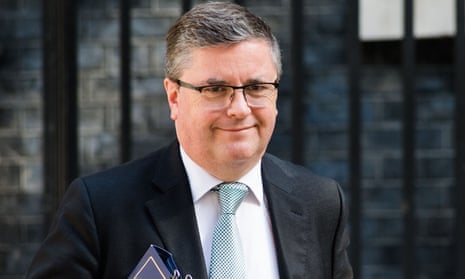The justice secretary has suggested that the anonymity of suspected sex offenders and others accused of serious crimes should be respected until they are charged if they have a reputation to protect.
Robert Buckland QC was asked if he supported a campaign to ban the naming of those arrested on suspicion of rape and other sexual offences, which has been led by Sir Cliff Richard and the radio presenter Paul Gambaccini, both falsely accused of historical sex offences.
The qualified barrister told the Times there was “merit” in extending this principle to all serious crimes.
No 10 distanced itself from Buckland’s remarks on Wednesday evening and said they did not reflect government policy.Buckland told the Times (paywall): “Let’s say you are a reputable local businessperson who is accused of fraud. Your good name is going to be really undermined by this mere accusation. You are a person of good character. That might be a meritorious case for anonymity.
“Let’s say you are a person with a list of previous convictions. You’ve committed offences. There is intelligence out there that suggests that other victims might come forward. Is that a case where anonymity should be automatic?”
Official guidance over whether arrested suspects’ names should be published ahead of charge is mixed, but the names are often disclosed by other means – particularly in high-profile cases.
Buckland’s suggestion comes after the trial and conviction of Carl Beech, who anonymously falsely accused senior political figures of sexual abuse and murder. The case has reignited the debate over whether those accused of sexual offences should be named before they are charged.
Police took almost a year to announce that Gambaccini would not face charges as there was insufficient evidence to prosecute him, despite the fact he was named directly after he was arrested in 2013.
Similarly, Richard was named after his Berkshire flat was raided in 2014 and he was forced to publicly deny the widely circulated false allegations before police confirmed he would not be charged in 2016.
Chris Henley QC, the chair of the Criminal Bar Association (CBA), said open justice was a fundamental and valuable cornerstone of the British system and that secret arrests were “the hallmark of oppressive regimes”.
“Whilst the police behaved lamentably in the Cliff Richard and Paul Gambaccini cases, it would be profoundly wrong to divide suspects into ‘people like us’ who are allowed anonymity, and the rest of society who are not,” he said.
The CBA said authorities should focus on investing in police resources to allow investigations to be conducted thoroughly and in a timely manner, while warning of possible future scenarios in which politicians could evade scrutiny in the event of their arrest.
“The public should be concerned about the unforeseen consequences of allowing anonymity to creep into the system,” a spokesperson said.
